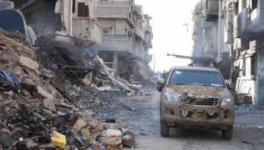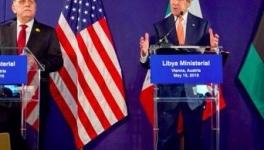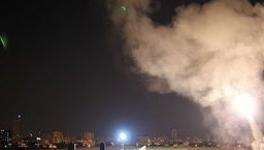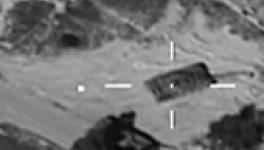'Oil - key to West's aims in embattled Libya' - Aijaz Ahmad
Professor Aijaz Ahmad warns against western intervention in the Libyan uprising and suggests that despite being a terrible ruler, Muammar Gaddafi enjoys a degree of support in his embattled country. Oil is the key issue in Libya and that explains the West's interest in the conflict there.
Prabir Purkayastha- Hello and welcome to Newsclick. Today we have with us, Professor Aijaz Ahmed, and we are going to take this discussion towards Libya. Aijaz, what do you think is happening in Libya at the moment? It does seem that Gaddafi has survived the initial onslaught and his regime is currently on the offensive.
Aijaz Ahmed- Yes, that is true. There was, I think, there was a disagreement, even among the forces that are now in power in Benghazi, over how far their troops should actually go. There was a strong opinion that they should stabilize only the places that they have in hand and essentially a line between eastern Libya and the rest. It's quite possible that the other faction which wanted to go to Tripoli prevailed and they don't have the personnel. They may not even have the weaponry to face Gaddafi's forces, but they certainly don't have the experience personnel to face an army. So it appears that they're over stretched, which is more or less what the regime may have been waiting for and now the counter attack has come.
My sense is that there will be some back and forth but that the counter-attack, on the whole, left to itself, will succeed. Not in recapturing the whole of Libya but certainly the farther perimeters of Tripoli will be secured. If you really look at what is happening, what we have is a historical split between the east and the west which could be the outline of what could emerge at least in the near future, unless Gaddafi has the strength to push his troops right up to Benghazi. The real issue, Gaddafi can live without Benghazi, still is the oil.
AA- Gaddafi's a terrible creatures so one shouldn't construe my comments into some sort of support for Gaddafi, but I think the media has played a dreadful role, and that includes Al- jazeera. People only from one side are being interviewed and projected and none from the other side.
Gaddafi's support is far beyond his own tribe. There is a whole conglomeration of tribes; they're a class of people, their institutional strengths and so on. I think there is considerable strength in the regime, at the core of the regime. It goes far beyond his tribe, the civil support for him.
PP- It's also clear that the US, the western powers would like to see Gaddafi go and take total control of Libya's oil and the kind of initial noises we heard were almost on the verge, talking about intervening in Libya; imposing no-fly zone on Libya that also seems to have subsided because I think it appears that the cost of military intervention appears to the west as too risky.
AA- No-fly zone may be coming very soon, as a matter of fact. The E.U. is in the process of backing the Americans very strongly on that issue. The French, today, recognized the council that has been set up by the position. The Gulf council, in which Saudi Arabia and all these Sheikdoms are included, has had a meeting in which they have called for a no fly zone and for a relationship with the opposition Council.
So a no-fly zone may well be coming. The real problem about the no fly zone is that the Russians are dead set against it. And Brazil, South Africa, India seem to be taking a position where now all members of the Security Council seem to be taking a position against the no fly zone. How long India will continue to take that position, how long South Africa will continue in that position I don't know, but Brazil will continue. China hasn't fully shown it's hand so we don't know where that is going. Will the Americans and the E.U. do a NATO no fly zone without Security Council authorization? A no-fly zone is not about flying aircrafts. It's about laying the groundwork for occupying at least certain parts of the country and for destroying the garrisons and fighting capacity on the ground.
Robert gates and others in charge of the American defense establishment have said that no fly zone really means a ground attack on the country. So that’s what a no fly zone really is about. It's not about some air force which Gaddafi has because he doesn't. Part of this council that has been setup in Benghazi has called for a no-fly zone. They're saying, not intervention but no-fly zone, which is an intervention. So a no-fly zone may be coming, I won't rule it out.
PP- While a no-fly zone can technically be imposed in the sense of people saying that there is a no fly zone. Strategically even the Iraq case has shown that it has really very little military significance. As you said, it's not that Gaddafi has this major air force which would then be immobilized. So, unless there is some kind of induction of troops on the ground, all that they can militarily do is to support Benghazi through providing arms and so on. That's why really, strategically, the no-fly zone doesn't make that much sense.
AA- The no fly zone in Iraq never really touched Saddam Hussein's forces there, his arsenal. It was essentially over Kurdistan, mainly. But it didn't, sort of, hit centers. The military capacity of the Gaddafi regime is so limited, that a couple of weeks of intensive bombing in the name of imposing a no-fly zone can take care of most of their arsenal and essentially enforce a stable division in the country.
AA- What is not clear to me, in all of this, is what they'll do in the coastal regions and with the harbours. That is to say export pipelines and export abilities and so on, it's not very clear what the game is in the no fly zone there. Will they actually land troops on the coastal regions to take hold of the harbours? That is not clear. The idea that Americans should learn from Iraq, from Afghanistan
is a rational idea that I don’t think flies very far in Washington.
PP- so what you're saying is that it is possible in the long run that you get a kind of client state developing in Libya
PP- In fact most of the Italian refineries use Libyan oil and are not geared to take other oil. Berluscone was also a great friend of Gaddafi's and shared certain common interests with him.
AA- A pack of thieves don’t have to stand together all the time.
PP- Thank you Aijaz
Get the latest reports & analysis with people's perspective on Protests, movements & deep analytical videos, discussions of the current affairs in your Telegram app. Subscribe to NewsClick's Telegram channel & get Real-Time updates on stories, as they get published on our website.
























